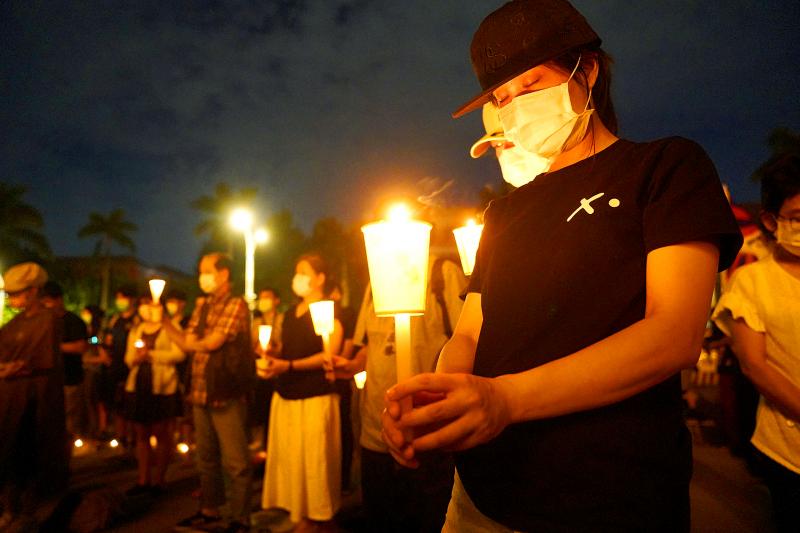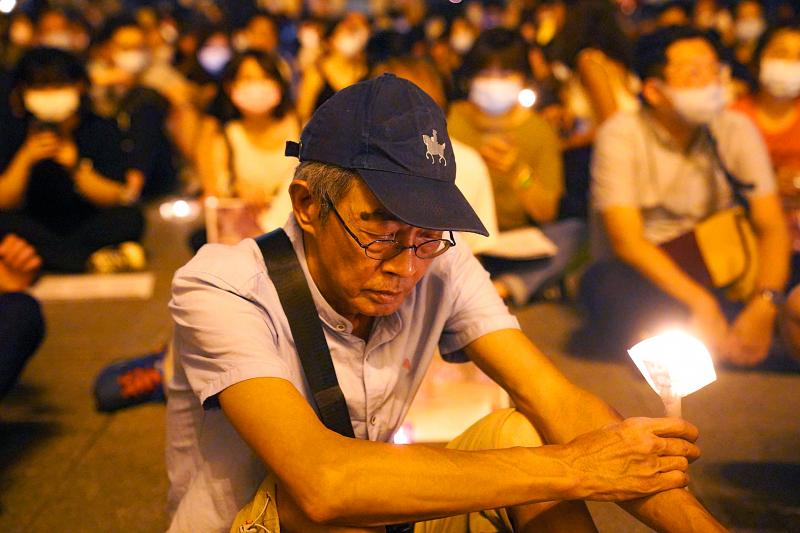Local officials and public figures across party lines yesterday commemorated the 31st anniversary of the Tiananmen Square Massacre while highlighting democratic values and the importance of learning from history.
President Tsai Ing-wen (蔡英文) posted on Facebook a photograph of a calendar page for June 4, saying that every year, one day in China is “forgotten.”
“While Taiwan had similar issues, we rediscovered these forgotten days, because we no longer need to keep historical truths hidden, allowing us more time to ponder the future,” Tsai wrote in Chinese.

Photo: CNA
She expressed her hope for no part of the world to have certain days removed from memory and said: “A free Taiwan supports the freedom of Hong Kong.”
Legislative Speaker You Si-kun (游錫堃) expressed regret for all those who were killed in Beijing on June 4, 1989, as well as for pro-democracy protests in Hong Kong.
“We must cherish our democracy and also concern ourselves with those who do not yet enjoy democracy,” You told reporters.

Photo: Liao Chen-huei, Taipei Times
He called on other democratic nations to jointly pressure Beijing into enacting reforms and allowing self-determination for Chinese.
Separately, former president Ma Ying-jeou (馬英九) on Facebook repeated his annual call for Beijing to face history and make amends for the massacre.
Freedom, democracy, human rights and the rule of law are Taiwan’s core values, Ma wrote, adding that Beijing pursuing the concepts would bring Taiwan and China closer, and help resolve its conflict with Hong Kong.

Photo: CNA
On Wednesday, Chinese Nationalist Party (KMT) Chairman Johnny Chiang (江啟臣) also urged Beijing to face the ghost of its past, and answer the calls for political reforms, democracy and liberty that the massacre represents.
The KMT supports the promotion of democracy, liberty and human rights, and it would not be blind, deaf, or mute about what it knows is the truth, Chiang said, adding that the party continues to believe in the goals it stated in 1989 of democratizing politics and liberalizing the economy.
At a Taipei City Council meeting yesterday, Taipei Mayor Ko Wen-je (柯文哲) said that the massacre was a tragedy of the modern era, and that he believed China would inevitably embrace democracy.
The Taipei City Government has been in talks with the Shanghai branch of China’s Taiwan Affairs Office, with both sides leaning toward holding this year’s Taipei-Shanghai twin-city forum via teleconference, Ko said, adding that the choice of software was still being discussed.
Suddenly halting the forum, which has been held for more than a decade, would set back relations, Ko said, adding that a platform must exist for mutual goodwill to be expressed.
In a radio interview yesterday, Hong Kong dissident and bookstore owner Lam Wing-kei (林榮基) said that he supports Taiwan’s stance of doing more than saying.
Lam’s bookstore, Causeway Bay Books (銅鑼灣書店) — named after the bookstore he managed in Hong Kong — opened in Taipei on April 25.
China is set on “reclaiming” Hong Kong, a goal evident since the beginning of anti-extradition bill protests, Lam said.
Taipei has helped nearly 300 Hong Kong pro-democracy activists without loudly trumpeting its efforts, which is smart, Lam said, expressing the hope that the government would allow Hong Kongers to stay in Taiwan for longer than six months.
Lam yesterday afternoon attended a news conference held by the New Power Party to mark the anniversary and its support for Hong Kong.
Hong Kongers should protect themselves and leave the territory if they feel that it is not safe there, and stay in Taiwan to save their energy for the long-term fight against China, he said.
Additional reporting by Shen Pei-yao, Chung Li-hua and Wu Su-wei

The CIA has a message for Chinese government officials worried about their place in Chinese President Xi Jinping’s (習近平) government: Come work with us. The agency released two Mandarin-language videos on social media on Thursday inviting disgruntled officials to contact the CIA. The recruitment videos posted on YouTube and X racked up more than 5 million views combined in their first day. The outreach comes as CIA Director John Ratcliffe has vowed to boost the agency’s use of intelligence from human sources and its focus on China, which has recently targeted US officials with its own espionage operations. The videos are “aimed at

STEADFAST FRIEND: The bills encourage increased Taiwan-US engagement and address China’s distortion of UN Resolution 2758 to isolate Taiwan internationally The Presidential Office yesterday thanked the US House of Representatives for unanimously passing two Taiwan-related bills highlighting its solid support for Taiwan’s democracy and global participation, and for deepening bilateral relations. One of the bills, the Taiwan Assurance Implementation Act, requires the US Department of State to periodically review its guidelines for engagement with Taiwan, and report to the US Congress on the guidelines and plans to lift self-imposed limitations on US-Taiwan engagement. The other bill is the Taiwan International Solidarity Act, which clarifies that UN Resolution 2758 does not address the issue of the representation of Taiwan or its people in

US Indo-Pacific Commander Admiral Samuel Paparo on Friday expressed concern over the rate at which China is diversifying its military exercises, the Financial Times (FT) reported on Saturday. “The rates of change on the depth and breadth of their exercises is the one non-linear effect that I’ve seen in the last year that wakes me up at night or keeps me up at night,” Paparo was quoted by FT as saying while attending the annual Sedona Forum at the McCain Institute in Arizona. Paparo also expressed concern over the speed with which China was expanding its military. While the US

SHIFT: Taiwan’s better-than-expected first-quarter GDP and signs of weakness in the US have driven global capital back to emerging markets, the central bank head said The central bank yesterday blamed market speculation for the steep rise in the local currency, and urged exporters and financial institutions to stay calm and stop panic sell-offs to avoid hurting their own profitability. The nation’s top monetary policymaker said that it would step in, if necessary, to maintain order and stability in the foreign exchange market. The remarks came as the NT dollar yesterday closed up NT$0.919 to NT$30.145 against the US dollar in Taipei trading, after rising as high as NT$29.59 in intraday trading. The local currency has surged 5.85 percent against the greenback over the past two sessions, central